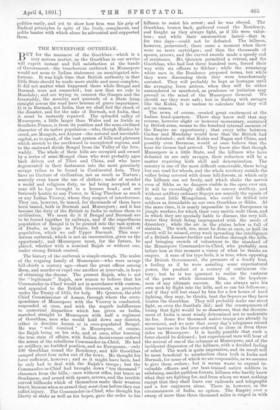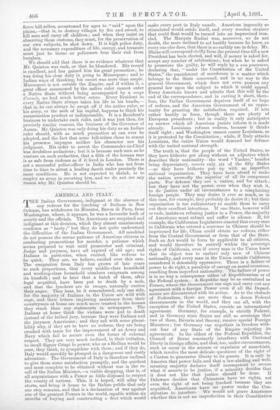THE AIITNEEPORE OUTBREAK.
BUT for the massacre of the G-oorkhas—which is a very serious matter, as the Goorkhas in our service will expect instant and full satisfaction at the bands of Government—the treacherous outbreak in Muneepore would not seem to Indian statesmen an unmitigated mis- fortune. It was high time that British authority in that little State should be made more stable and more complete. It did not matter what happened there while Bengal and Burmah were not connected ; but now that we rule in Mandalay, and are trying to connect the Ganges and the Irrawaddy, the security and quietude of a State lying straight across the road have become of grave importance. It is in Burmah, not India, that we shall feel the shock of the disaster, and for the sake of Burmah, not India, that it must be instantly repaired. The splendid valley of Muneepore, a little larger than Wales and as fertile as Southern France, is from its position and the semi-civilised character of its native population—who, though Hindoo by creed, are Mongols, not Aryans—the natural and inevitable capital, so to speak, of the vast system of hills and plateaus which stretch to the northward to unexplored regions, and to the eastward divide Bengal from the Valley of the Irra- waddy. The whole of these hills are occupied and owned by a series of semi-Mongol clans who were probably ages back driven out of Tibet and China, and who have degenerated in their fastnesses into the most genuinely savage tribes to be found in Continental Asia. They have no tincture of civilisation, not as much as Tartars ; scarcely even know the use of clothes ; make of murder a social and religious duty, no lad being accepted as a man till he has brought in a human head ; and are furiously hostile to any Power, to King Theebaw as much as any Indian Viceroy, whom they suspect of interference. They can, however, be tamed, for thousands of them have been tamed, both in Burmah and Muneepore ; and it has become the duty of the British in India to reduce them to civilisation. We must do it if Bengal and Burmah are to be bound together by railways, and if the superfluous population of Bengal is to be poured into the vast system of Doabs, as large as France, bu't nearly devoid of population, which we call Upper Burmah. This mur- derous outbreak, which is not an insurrection, gives us the opportunity, and .Muneepore must, for the future, be placed, whether with a nominal Rajah or without one, under strong British control.
The history of the outbreak is simple enough. The males of the reigning family of Muneepore—who were savage hill-chiefs a century ago—share the great offices among them, and murder or expel one another at intervals, in hope of obtaining the throne. The present Rajah, who is not the " legitimate " Rajah, saw reason to believe that his Commander-in-Chief would act in accordance with custom, and appealed to the British Government, as protector under the Treaty of 1835, for help. Mr. Quinton, the able Chief Commissioner of Assam, through whom the corre- spondence of Muneepore with the Viceroy is conducted, responded, at once, and with the superb indifference to numerical disparities which has given us India, marched straight to Muneepore with half a regiment of Goorkhas, men who would hold down any district, either in desolate Assam or in over-populated Bengal. He was " well received " in Muneepore, of course, the Rajah being on his side, and at once, after learning the true state of affairs, with Indian decisiveness ordered the arrest of the rebellious Commander-in-Chief, He had no artillery, no fortified position, and no Europeans,—only 100 Goorkhas round the Residency, and 450 Goorkhas camped about four miles out of the town. He thought his force sufficient, however ; and so it might have been, had he only had to deal with the Rajah's troops ; but the Commander-in-Chief had brought down "ten thousand" clansmen from the hills,—men without rifles, but brave as Soudanese, and armed with spears, arrows, and the terrible curved billhooks which of themselves make their wearers brave, because when so armed they must close before they can inflict injury. The Commander-in-Chief, who thought his liberty at stake as well as his hopes, gave the order to his hillmen to resist his arrest ; and he was obeyed. The Goorkhas, beaten back, gathered round the Residency, and fought as they always fight, as if life were value- less ; and while their ammunition lasted—that is, for two days—could not be defeated. The hillmen, however, persevered ; there came a moment when there were no more cartridges ; and then the thousands of spears, arrows, and the curved swords made a speedy end of resistance. Mr. Quinton permitted a retreat, and the Goorkhas, who had lost three hundred men, forced their way with six officers to Silchar ; while the remaining white men in the Residency proposed terms, but while they were discussing them they were treacherously arrested. They will probably be kept as hostages until the avenging force arrives, when they will be either surrendered or murdered, as prudence or irritation may prevail in the mind of the Muneepore General. We should say they were safe; but in dealing with savages like the Kukla, it is useless to calculate that they will act on reason.
The news, of course, created great excitement at the Indian head-quarters. There they know well that any reverse, however slight or however momentary, sustained by British arms, means to the hundred internal enemies of the Empire an opportunity ; that every tribe between Cachar and Mandalay would hear that the British had been defeated ; and that Kukis and Nagas and Chins, and possibly even Burmese, would at once believe that the hour for license had arrived. They know also that though Muneepore is a little State, and the hillmen who have defeated us are only savages, their reduction will be a. matter requiring both skill and determination. The country is one of the most difficult conceivable, there being but one road for wheels, and the whole territory outside the valley being covered with dense hill-forests, in which only the hillmen can act freely, and which shake the nerves even of Sikhs as no dangers visible in the open ever can. It will be exceedingly difficult to convey artillery, and without artillery ordinary Sepoys are scarcely the equals of the stout little Mongolians, who could be drilled into soldiers as formidable as our own Goorkhas or Sikhs. At the same time, it is nearly impossible to use Europeans in jungle warfare, for which their very merits unfit them, and in which they are specially liable to disease, the very hill- water they drink being impregnated with the seeds of dysentery ; while the air in the plains below is full of malaria. The work, too, must be done at once, or half its result will be missed, every week spreading the intelligence of a British disaster further and further through the hills, and bringing crowds of volunteers to the standard of the Muneepore Commander-in-Chief, who probably sees before him at this moment a vision of what he thinks an empire. A man of his type feels, it is true, when opposing the British Government, the pressure of a deadly fear, a feeling as if he were assailing some supernatural power, the product of a century of continuous vic- tory; but he is too ignorant to realise the vastness of the power which threatens him, or the hopeless- ness of any ultimate success. He can always save his own neck by flight into the hills, and so can his followers ; and if they will but stand by him for a few hours of hard fighting, they may, he thinks, beat the Sepoys as they have beaten the Goorkhas. They will probably make one stout fight, as even the Santlials did ; and the consequences of losing that fight would be so disastrous, that the Govern- ment of India is most wisely determined not to underrate its foe. Some five thousand native troops are already in movement, and we note that every day's telegrams record some increase in the force ordered to close in from three sides on Muneepore. It is hardly possible that such a. force should be defeated ; but experienced men will hear of the arrival of one of the columns at Muneepore, and of the incidental dispersion of the hillmen, with a decided feeling of relief. The work is quite imperative, and its result will be most beneficial to numberless clans both in India and Burmah, for some of which we are responsible, as we assume to give them orders ; but it seems waste to expend in- valuable officers and our best-trained native soldiers in subduing, amidst pathless forests, hillmen who hardly know what they are fighting for, and from whom we want nothing except that they shall leave our railroads and telegraphs and a few engineers alone. There is, however, in the 'circumstances of India, no option. The Empire over a sweep of more than three thousand miles is ringed in with fierce hill-tribes, accustomed for ages to "raid" upon the plains,—that is, to destroy villages by fire and sword, to kill men and carry off children ; and when they insist on observing those customs, they must, for the preservation of our own subjects, be shot down. It is high police duty, and. the necessary expenditure of life, energy, and treasure must just be borne as policemen bear their risk from burglars. We should add that there is no evidence whatever that Mr. Quinton was rash, or that he blundered. His record is excellent, and has gained him his great promotion ; he was doing his clear duty in going to Muneepore ; and to Indian ways of thinking, his escort was more than ample. Muneepore is not outside the Empire, and if within it, a great officer summoned by the native ruler cannot enter a Native State without being accompanied by a corps d'arinje, we had much better retire. Every Resident in every Native State always takes his life in his hands,— that is, he can always be swept a if the native ruler, or his army, or the mob of his capital, happens to think his assassination prudent or indispensable. It is a Resident's business to undertake such risks, and it was just then, for precisely similar reasons, the business of the Governor of Assam. Mr. Quinton was only doing his duty as an Indian ruler should, with as much precaution as can ever be adopted, and the fact that some hill-tribes chose to resent his presence impugns neither his character nor his judgment. His order to arrest the Commander-in-Chief was doubtless audacious ; but it is because such men as he venture on such audacities, that a, fifth of the human race is as safe from violence as if it lived in London. There is not a successful police-officer in India who has not from time to time to arrest a leading dacoit under precisely the same conditions. He is not expected to shrink, or to employ an army in escorting him, and we do not see any reason why Mr. Quinton should be.







































 Previous page
Previous page